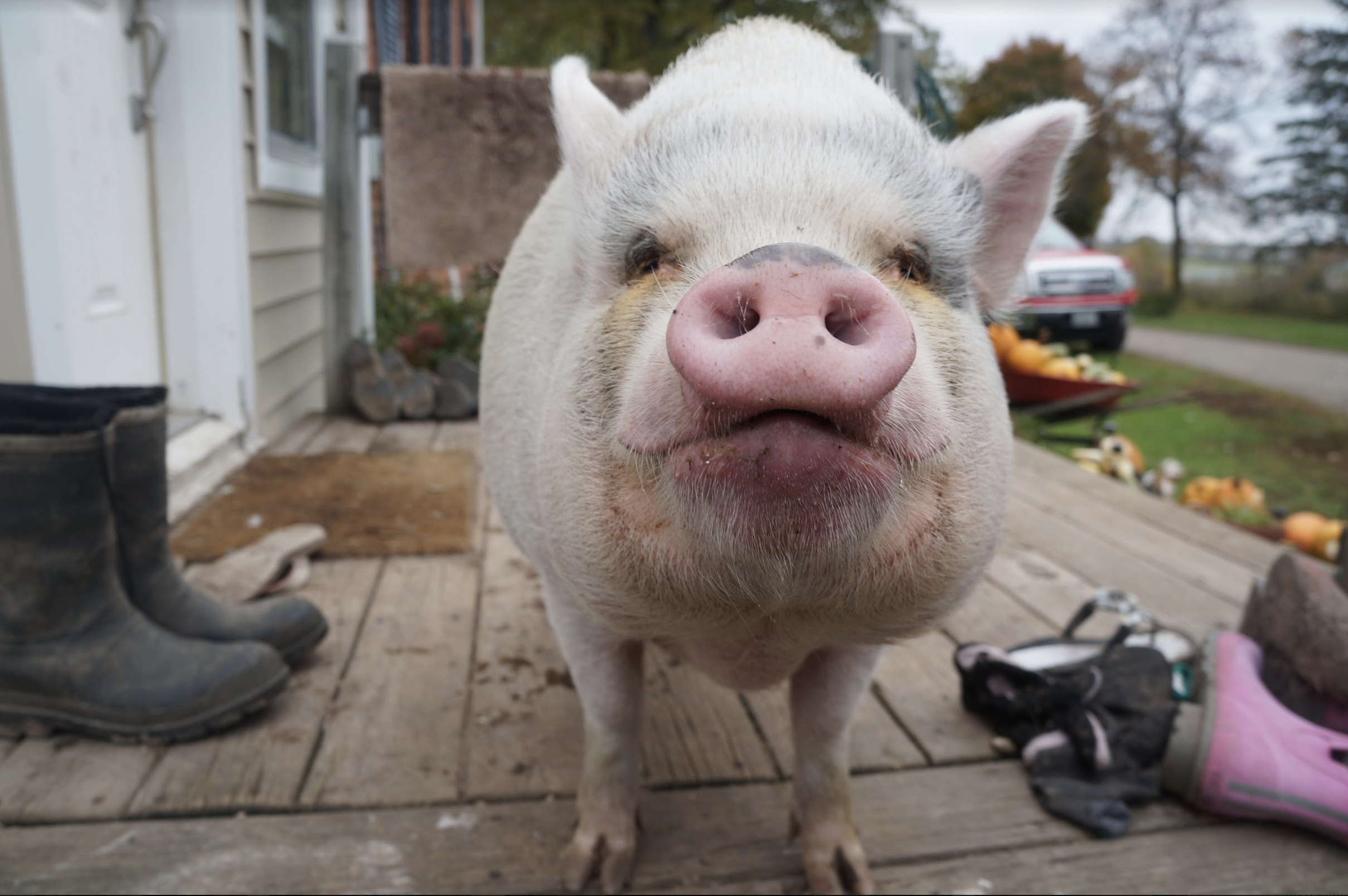
Hilda was so sick she couldn’t even stand. And the shadows swirling around her didn’t seem to care. She blacked out, and it’s lucky she did because where she was about to end up would almost surely have sealed her fate: on a pile of her dead friends. She wasn’t known as Hilda, then. But the soft bed of hay she found herself resting on when she came to was her start down a path to healing and love.
The farm sanctuary movement was born when Gene Baur rescued Hilda behind a Lancaster, Pennsylvania stockyard 1986. He sold vegan hotdogs out of his VW van in Grateful Dead concert parking lots to raise funds for his aptly-named Farm Sanctuary, where Hilda lived 10 long years. Today, there are about 100 sanctuaries across the United States with six in Minnesota and one in western Wisconsin. Let’s take a look at how our local sanctuaries are contributing to the movement.
Meet some of the sanctuaries around the Twin Cities
ANNA LAKE ANIMAL SANCTUARY IN UNDERWOOD SINCE 2017
Anna Lake is a microsanctuary that is home to 20 chickens, five ducks, and three cows. They provide rescue, education, and adoption. The microsanctuary movement believes that rescue can be just as effective on a small scale. annalakeanimalsanctuary.com
CHICKEN RUN RESCUE IN MINNEAPOLIS SINCE 2001
Chicken Run provides shelter, vet care, love, and adoptive homes to rescued chickens. They’re the only urban chicken rescue of its kind. They educate the public about how adopting animals impacts their lives and encourage all to help further positively impacting the lives of chickens by adopting a vegan diet. chickenrunrescue.org
FARMASTE IN LINDSTROM SINCE 2016
Farmaste offers rescue, a safe haven, and rehabilitation to unwanted, injured and abused farm animals. They offer many community outreach programs and camps to promote compassionate and mindful living that inspire folks to rethink what they can do to impact the lives of farmed animals. farmaste.org
LITTLE ACORN SANCTUARY IN CASTLE ROCK SINCE 2018
Little Acorn is Minnesota’s newest sanctuary and has big dreams about the role they will play in the lives of farm animals that have been abused, abandoned, or neglected. Their current residents include goats and chickens. They offer private tours, as well as volunteer opportunities. They work hard to educate the public about the harmful effects of factory farming. littleacornsanctuary.org
ROOSTER REDEMPTION IN CENTER CITY SINCE 2016
Rooster Redemption currently provides sanctuary for 23 abandoned, exploited, and mistreated roosters. They choose to refrain from giving regular public tours but can make special arrangements for visitors. roosterredemption.org
SPRING FARM SANCTUARY IN LONG LAKE SINCE 2016
Spring Farm was one of the first farm animal sanctuaries in Minnesota and is “committed to ending farm animal cruelty and promoting vegan living through our rescue, rehabilitation and education efforts.” Owner Robin cares for 20+ residents while educating the local community through events and tours about the environmental effects of industrial animal agriculture and the conditions animals endure. springfarmsanctuary.org
SOULSPACE FARM SANCTUARY IN NEW RICHMOND, WISCONSIN SINCE 2015
SoulSpace opened in 2015, has 40+ residents, and “works to inspire change in the way society views farm animals and support people in their quest to live a more compassionate lifestyle.” People of all ages can volunteer or take a tour. They host one- and four-day education programs. And in 2017, owner Kara opened a vegan Airbnb (guests are asked not to consume animal products on sanctuary grounds during their stay) on her farmhouse’s upper level to further fund and fulfill their mission. soulspacesanctuary.org

More than just a home
Minnesota and Wisconsin are fortunate to be home to so many of these important allies in the animal rights movement. Their residents experience healing and the chance to be themselves. Visitors learn how advocating for changes to factory farming and adopting a plant-based diet can make an impact. Volunteers put their passion for animal rights into action through direct care and education.
At their heart, farm sanctuaries are safe spaces of change and healing for both their residents and surrounding communities. We are so grateful for the work these sanctuaries and their residents do! Each year, CAA organizes group visits to some of our local sanctuaries. To pre-register for one of these life-changing trips, visit exploreveg.org/events or email [email protected] to learn more and get involved.
__________________________
This article was originally published in the 2019 issue of Twin Cities Veg Living.
Emily Kampa is a writer, animal lover, and foodie. She lives in St. Paul, Minnesota with her wife Laura and their American Staffordshire Terrier, Pip.

